The next Assassin’s Creed is going to turn heads. That won’t just be because it’s set in ancient Greece, nor simply because it lets you play as a man or a woman. It’s also changing the series’ combat yet again, offering more options for stealth, and even fleshing out the modern-day stuff that’s been lacking in recent games in the series.
On a Friday in early June I was able to play Odyssey for over an hour and ask a lot of questions afterwards. I’ve done this thing before and always try to leave these sorts of events with as much information as possible for my fellow Assassin’s Creed obsessives.
Over the years, I’ve tempered my expectations after the occasional disappointing entries in the series, but also learned to trust that, more often than not, the AC teams get things mostly right.
This time, while I saw a game that initially looked a lot to me like last year’s Origins, I left with a clearer sense of how it will be different. Most of the changes are things I’m excited to play more of when the game comes out on October 5 on PS4, Xbox One and PC.
-
This is the most ancient AC game, from the team that made the most modern one. The main studio behind Odyssey is Ubisoft Quebec, which previously led development of 2015’s Assassin’s Creed Syndicate. That game primarily took place in England during the Industrial Revolution and was therefore the most modern of the AC games.
Odyssey, set primarily in and around 431BC during the Peloponnesian War, is the furthest back, some four centuries earlier than 2017’s Origins, which took place in Egypt just before the turn of the millennium.
Odyssey‘s action is set before the founding of the assassins’ brotherhood, though AC buffs will recall that there were some assassins, such as the Persian Darius cited in Assassin’s Creed 2, who precede Odyssey (Darius is right before it).
-
It’s going to be more of an RPG than ever. Odyssey creative director Jonathan Dumont says the new game “is pushing our franchise into full RPG”.
He might as well have said it’s going full BioWare, as Odyssey is bringing several role-playing game stand-bys familiar in that studio’s RPGs into Assassin’s Creed for the first time. Those include a multiple choice dialogue system, branching quests, multiple possible endings, and even the ability to romance several characters.
- A major theme for the game is freedom vs. order. “Are you proposing order or actually freedom?” Dumont pondered of the actions players will take in the game. “We really like that, because the Greeks actually were asking those questions, because all their mythology is based on order and chaos.”
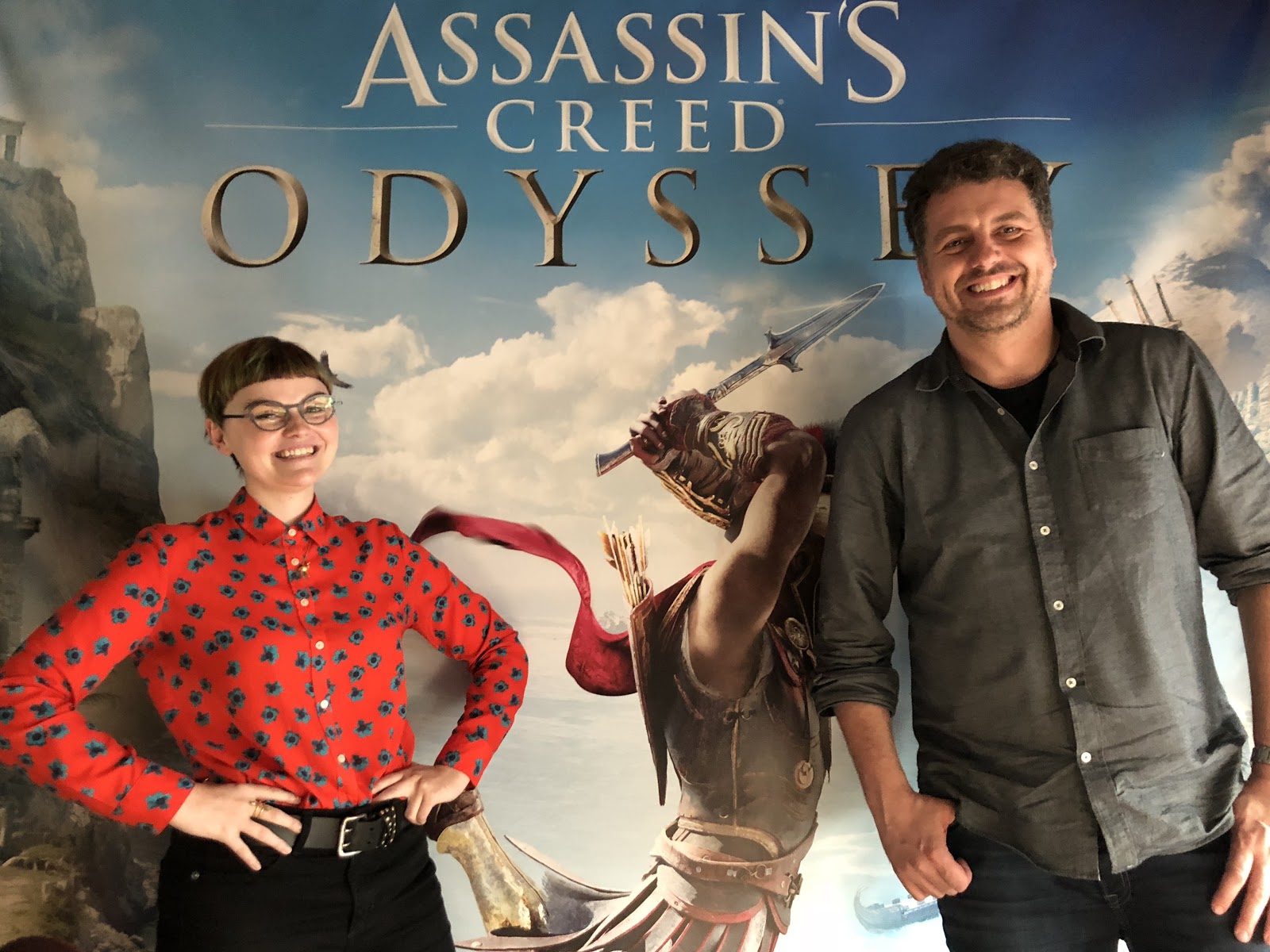
Narrative director Mel MacCoubrey has worked on AC games since Freedom Cry and creative director Jonathan Dumont was world director on Syndicate and spent several years before that designing World of Warcraft games.
-
The character choice is for looks and won’t affect gameplay or story. Near the start of the game, players decide to play as either Alexios or Kassandra, a man or a woman.
Playing as a woman in AC isn’t new. People could do that in 2012’s Liberation and in parts of Syndicate and Origins. Choosing which character to play as, however, is new. Dumont chalked it up to wanting to give players as much choice as possible and said it won’t affect how the game plays or wraps up.
“The stories are similar,” Dumont said. “You don’t have many changes. The acting is a little different because the actors give it their own sauce. It’s much more a vehicle for how you want to roleplay with these characters.” There are no gameplay-specific differences and even the characters who are available to romance are the same regardless of who you choose. “You do you, man,” narrative director Mel MacCoubrey told me.
-
They’re all-in on the modern day and First Civilisation stuff this time. At events such as these, Assassin’s Creed developers seldom say a word about the modern day aspect of upcoming games in the series. That’s to the relief of the large part of the fanbase that isn’t into that stuff, and to the frustration of those of us who love it and have lately been disappointed by how slender recent offerings have been.
To my delight, Dumont happily explained the set-up for the modern part of the game. Even more exciting for us weirdos who like the deep lore might be the extent to which the Odyssey developers are promising connections to the mysterious First Civilisation, the barely-seen progenitors to the series’ Assassin-Templar conflict.
“At the heart we are going back to Layla, where her story continues,” Dumont said, referring to Assassin’s Creed Origins‘ new modern day hero, the researcher Layla Hassan.
“Layla’s quest to find First Civ artefacts and First Civilisation information leads her to discover one day a lost book, the lost book of Herodotus, the first historian. And that book refers to a Spartan mercenary that would have been in contact with First Civilisation artefacts. Hell, he might have even wielded one.”
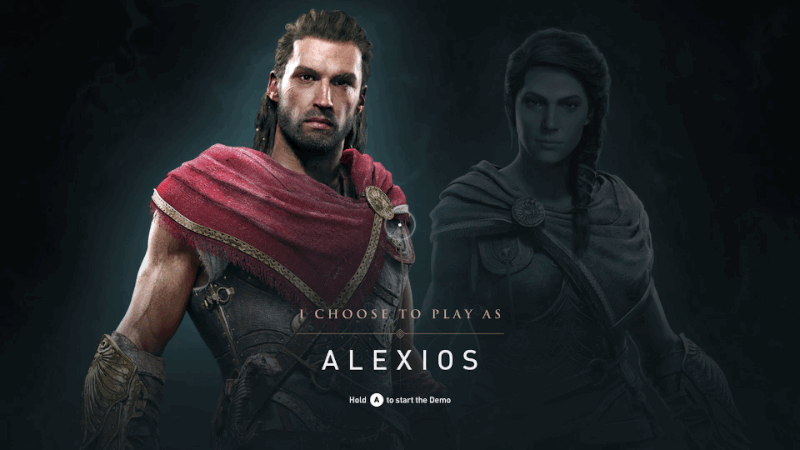
-
There’s a narrative explanation for the option to choose your character. The initial conceit of Assassin’s Creed games was that a person in the modern day used a device called the Animus to live through the memories of one of their ancestors.
That was clever, and it’s a minor shame that Ubisoft wasn’t able to stick to that concept which helped the series feel so distinct. Last year’s Origins showed a way around it. Layla can use a modified animus that enables her to experience the memories of people she isn’t related to.
In Odyssey‘s case, Dumont said, there are “two possible matches for DNA” for the person whose life she is trying to experience, which is the explanation for why players can choose who they control. Hey, at least they have an explanation!
-
The game world is enormous and geographically diverse. Dumont described the game as the biggest one yet for the AC series. That has to be qualified by the fact that a lot of it is set on water.
The game world is full of various biomes, presenting players with everything from snow-capped mountains to forests to beaches. Chunks of the game are considered by the developers to be “regional content” that functions outside of the main story and presents contained narratives and adventures for players to experience.
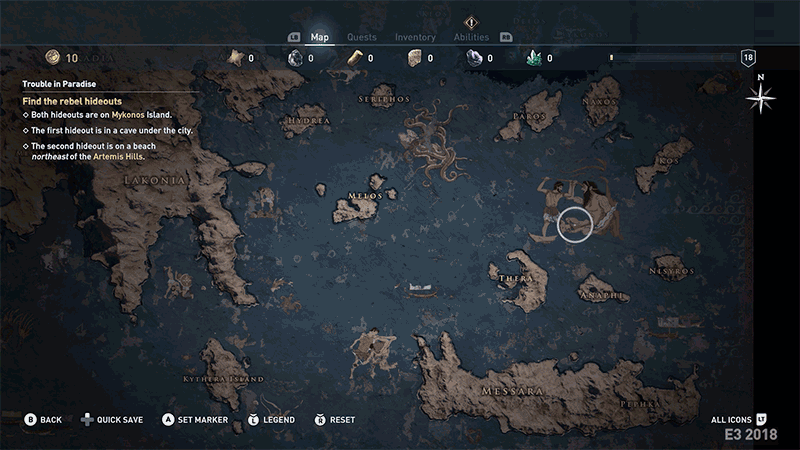
The bright area on the rightis the region that is available in the game’s E3 demo. The game’s producer ballparked the size of that one area as being roughly equivalent to that of the entire playable area of Assassin’s Creed Brotherhood.
-
Your main weapon is a spear, not a hidden blade. Whether the player decides to be Alexios or Kassandra, they’re playing as the child of Leonidas and wielding his spear. In the lore of the series, Leonidas is said to have First Civilisation DNA. His spear, rather than a hidden blade, is the game’s signature weapon. It is a First Civ artefact and possesses a seemingly otherworldly power.
The gist of the ancient Greek storyline is that your family line is prophesied to bring doom to Sparta, which somehow leads to you getting thrown off a mountain, then surviving and resurfacing 17 years later as a mercenary who gets the chance to discover a conspiracy against your family. Revenge for attacks on one’s family is an AC tradition. Just ask Ezio and Bayek.
-
You have a bird again. Odyssey uses enough of Origins‘ graphical tech and iconography that it might be seen as a re-skin of last year’s ancient Egypt epic.
Origins players will recognise a lot of the same interface and gameplay options, including the returning radial compass that replaced the franchise’s old mini-map and even the return of a drone-like bird who can survey the landscape, spot treasure, and highlight and harass enemies. The bird is called Ikaros in this one.
Building on a recent game is not necessarily a bad thing. Some of the best-regarded AC games, including 2, Rogue and Syndicate all were relatively light on technological innovation and were instead strong on gameplay improvement and creative world-building.
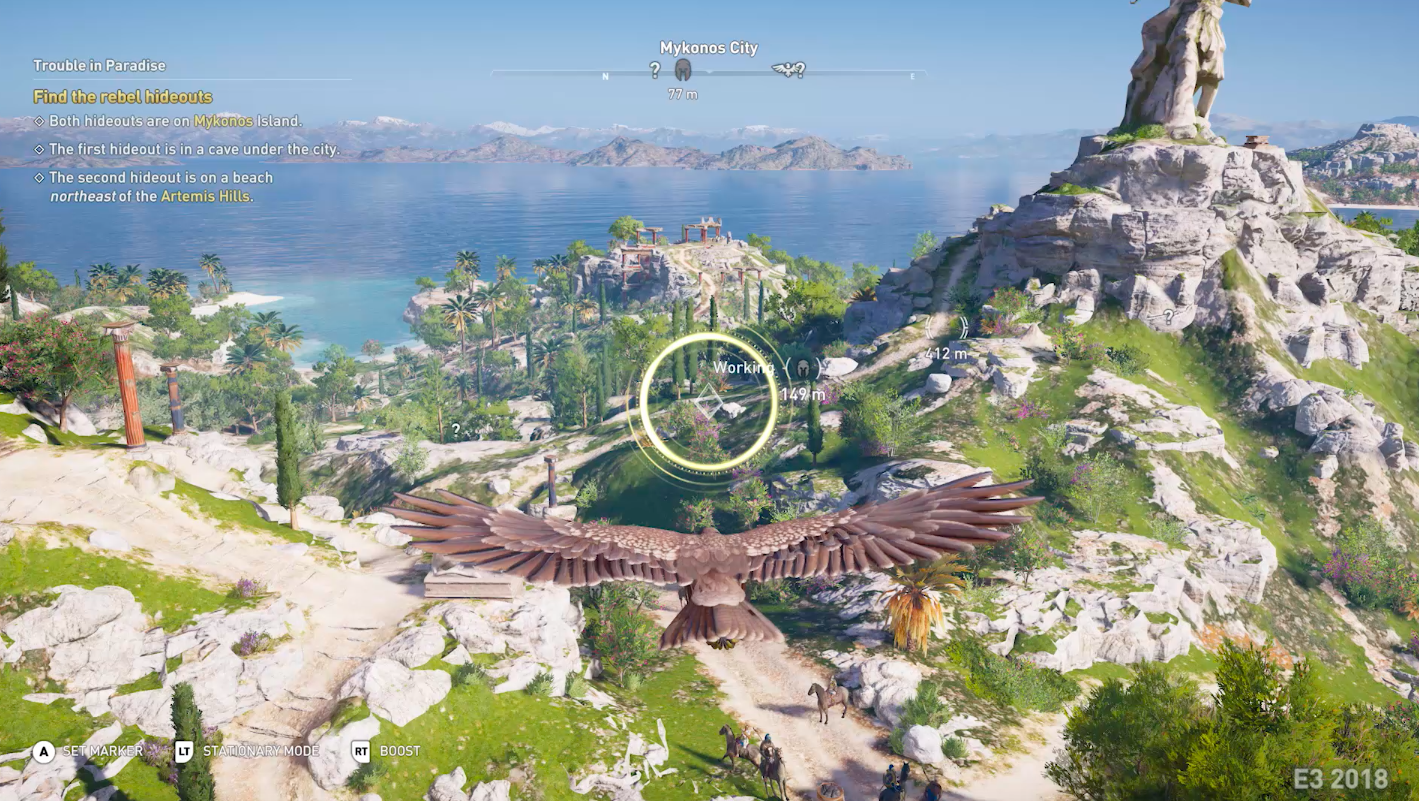
- Most of what Origins discarded is still gone. Old gameplay tropes such as climbing towers to defog the map remain abandoned, as they were in Origins. Social stealth (blending in with crowds) isn’t back either. There are still eagle dives, of course. I did one from the top of a boat into the sea. Anyone else remember when you couldn’t swim in these games?
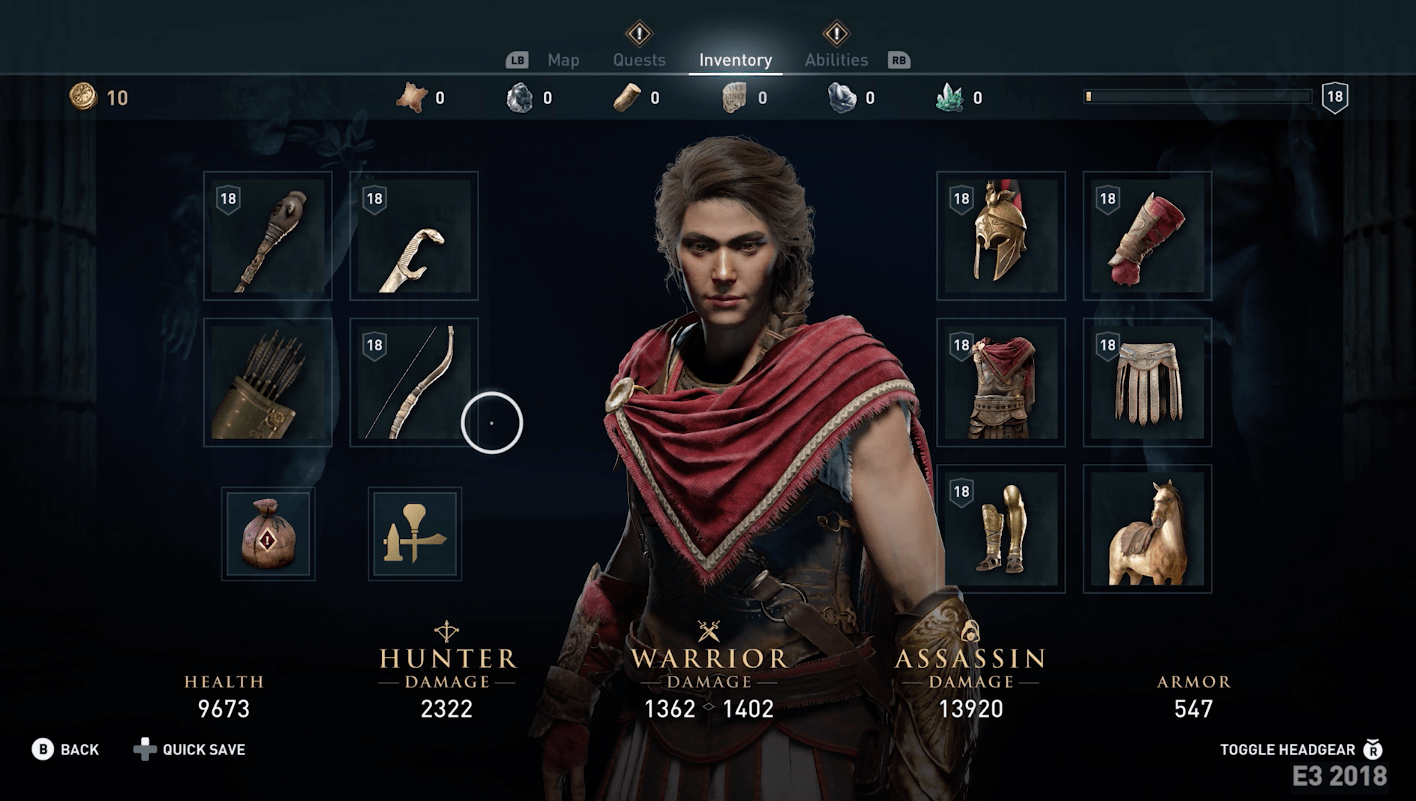
Odyssey explicitly quantifies the player’s prowess in three styles of play: Ranged fighting (Hunter), close-up brawling (Warrior) and stealth (Assassin).
- Character outfits will be far more customisable. Despite surface similarities, there are a heap of tweaks to the Origins formula evident even in Odyssey‘s E3 demo. The loot system returns, for example, but instead of one category for wearable gear there are five. Gear is classified by rarity. Each piece of gear can be enhanced with engravings that might increase critical hit damage or fire damage, for example.
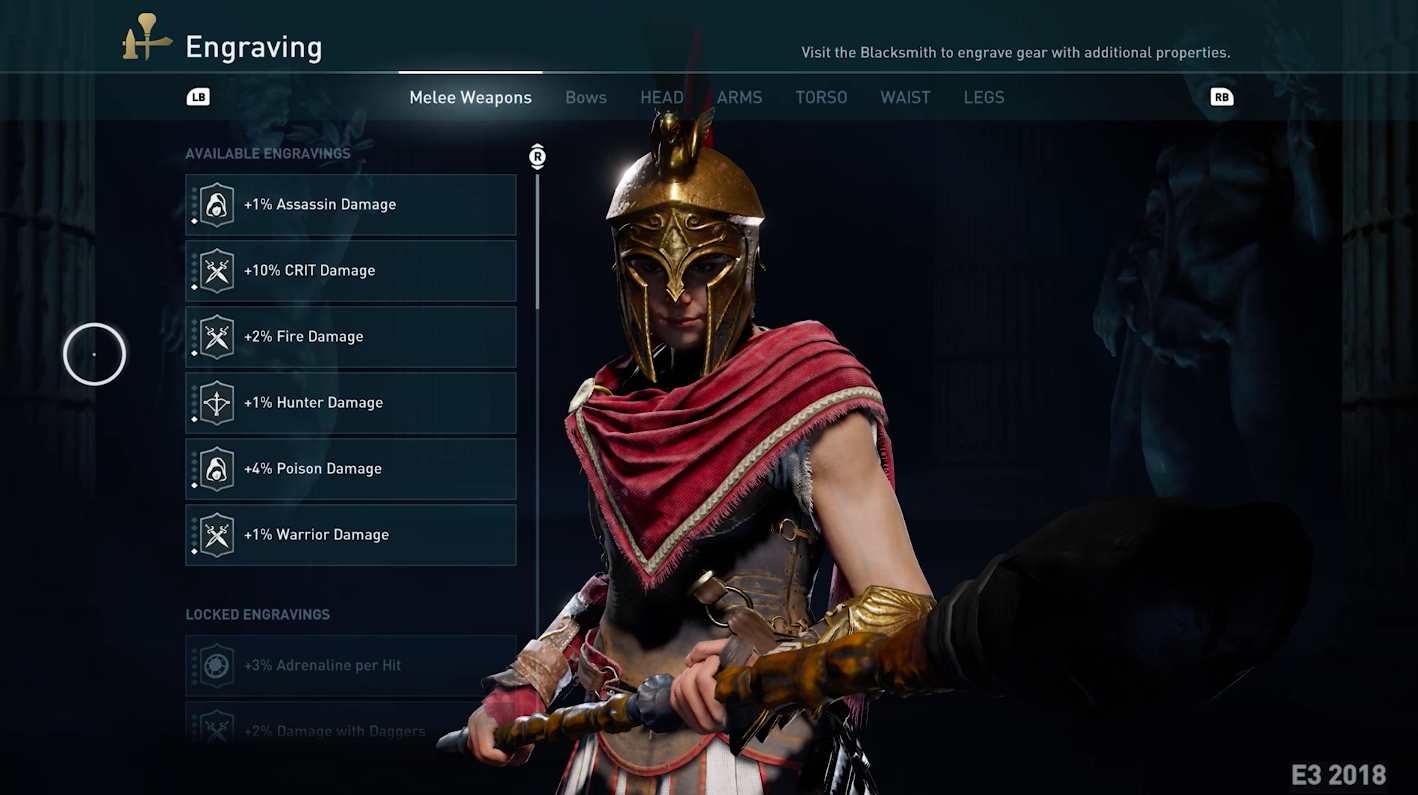
Engravings enhance your gears’ stats
-
The skill tree and the way abilities are triggered have both been been adjusted as well. Some skills are common to any play style. That includes things such as calling for your horse or bird, changing the game from day to night (a neat feature returning from Origins), or knocking out and recruiting enemies (more on that later). As with Origins, the skill tree branches to offer new moves that cater toward ranged combat, close swordplay or stealth.
The divides in Odyssey‘s tree are more clear-cut and are deepened by offering players the option to unlock higher-tier versions of skills. For example, you might spend upgrade points across several play-styles, unlocking a ranged ability to fire multiple arrows at once, a warrior move that lets you set your weapons on fire, and a stealth move called rush assassination, which lets you throw your spear at an enemy and then warp to them for a potential kill and then chain a second kill.
You could alternately forgo the ranged and warrior skills and instead get rush assassination up to level two (allowing for a stronger initial attack and the chance to chain not one but two more attacks to it) and then unlock an extra stealth skill on top of that. That’s significant, but the even bigger change is that players can map many of the most action-oriented moves to their controllers’ face buttons. This is plays a role in…
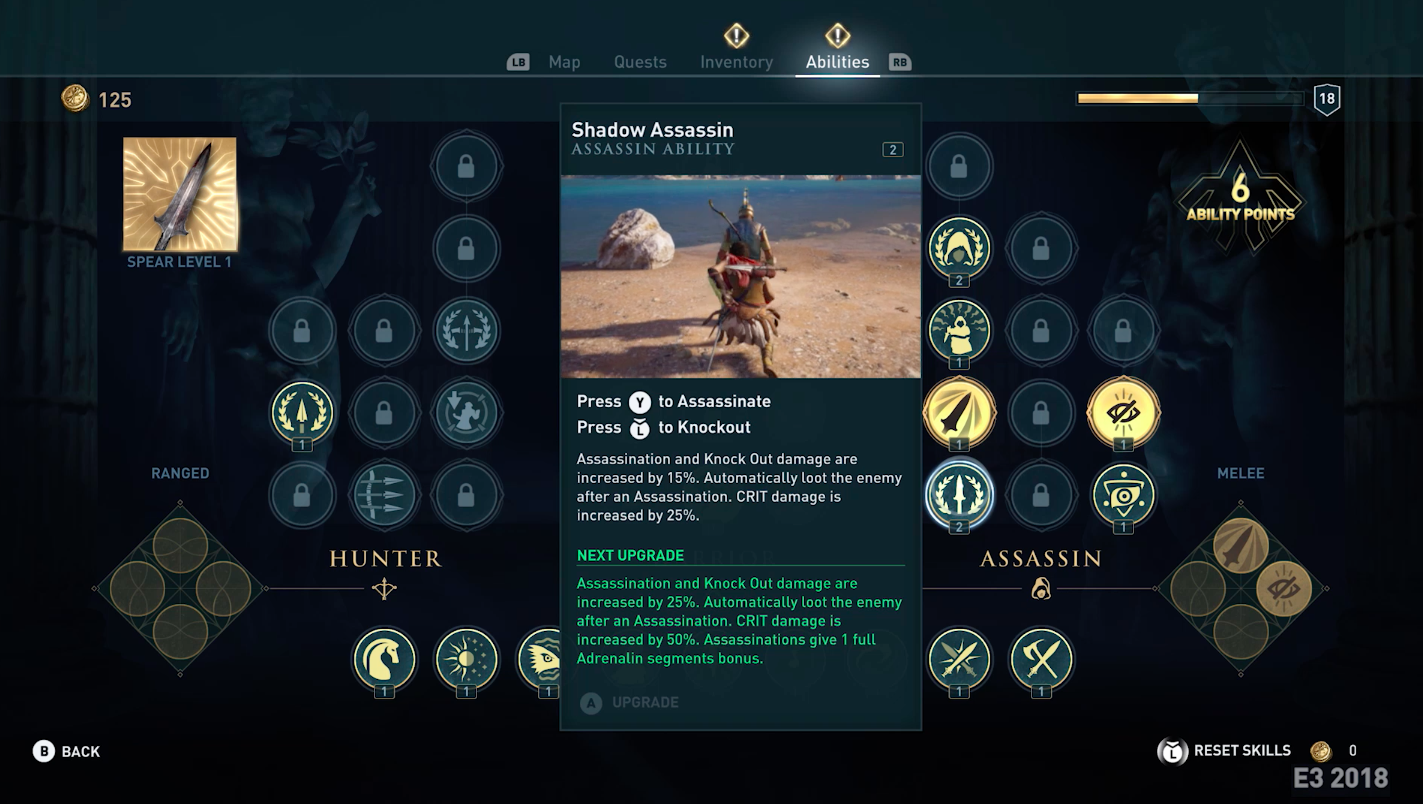
Several baseline skills are given to all players, but players then pick more skills from the hunter, warrior or assassin trees. In this screenshot, the warrior branch is hidden behind a pop-up that shows a stealth ability that can be upgraded after it is unlocked.
-
The combat system from Origins has been given a major twist. Combat is still based on hitboxes, requiring players to focus on well-timed attacks that happen at an effective range. New, however, is the option to map four or more moves to the face buttons and then trigger those moves as the player builds up their adrenaline meter.
As I played the demo, this appeared to help diversify my arsenal and remedy the lack of available moves that held Origins‘ combat back from being as enjoyable as, say, God of War‘s. In the midst of a battle, a player who has, say, a Spartan Kick and a shield-grab mapped to the face buttons can do regular attacks, build adrenaline, and then press left bumper (or L1) to unleash a kick or to grab the enemy’s shield and throw it at them. I tried that. It was fun.
Players who favour stealth or ranged play can map adrenaline moves tied to those skill branches and unleash moves of those types instead. That was cool, too.
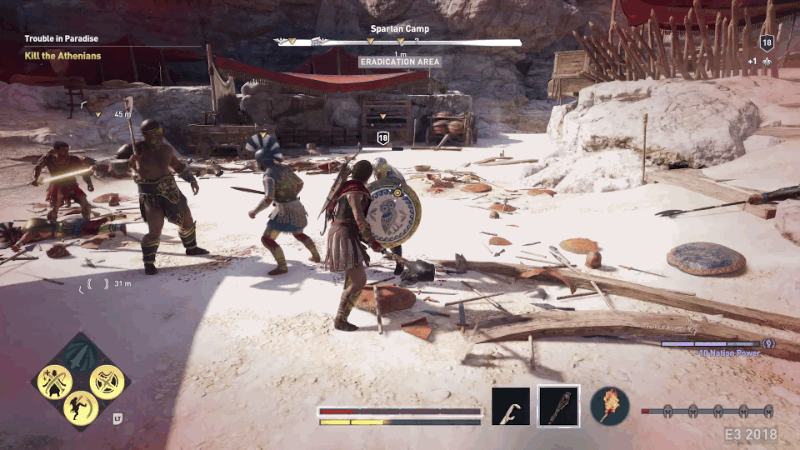
The shield grab costs a notch of adrenaline as it is spent with a button press.
-
They’re improving stealth. Stealth was an option in AC Origins, but not a great one. That game’s lead protagonist, Bayek, couldn’t reliably assassinate high-level enemies with his hidden blade, and players were generally not incentivised to clear enemy bases without raising alarms.
Dumont said they have tweaked the experience points payout for stealthy play in Odyssey, giving players more for stealth kills, on the assumption that the time spent to get one stealth kill might be the same as running in and loudly chopping through a few enemies.
Leonidas’ spear, taking the place of the hidden blade, will be good for a one-hit stealth assassination of enemies the same level as the player or one level above, according to Dumont.
The stealth part of the skill tree also displays a wider array of stealth moves, including the option to send recruited allies in to cause distractions and a move that lets you rush up onto an enemy to stealth-kill from range and then even chain in a second kill.
-
The boat is a big part of the game. Odyssey won’t just give AC players flashbacks to Origins. It’s also a callback to the water-based adventures of Assassin’s Creed 4: Black Flag and AC: Rogue.
Odyssey offers players a huge world that has a lot of water in it. Players can sail the Aegean sea, hopping from one Greek island to the next, while engaging in naval combat against enemy ships.
There may be other sea-based gameplay activities, since a trailer for the game showed one of the characters doing what looked like a deep dive. But all that was shown in the E3 demo were familiar naval skirmishes, complete with the ability to ram boats, order the crew to fire arrows or spears, and board disabled ships.
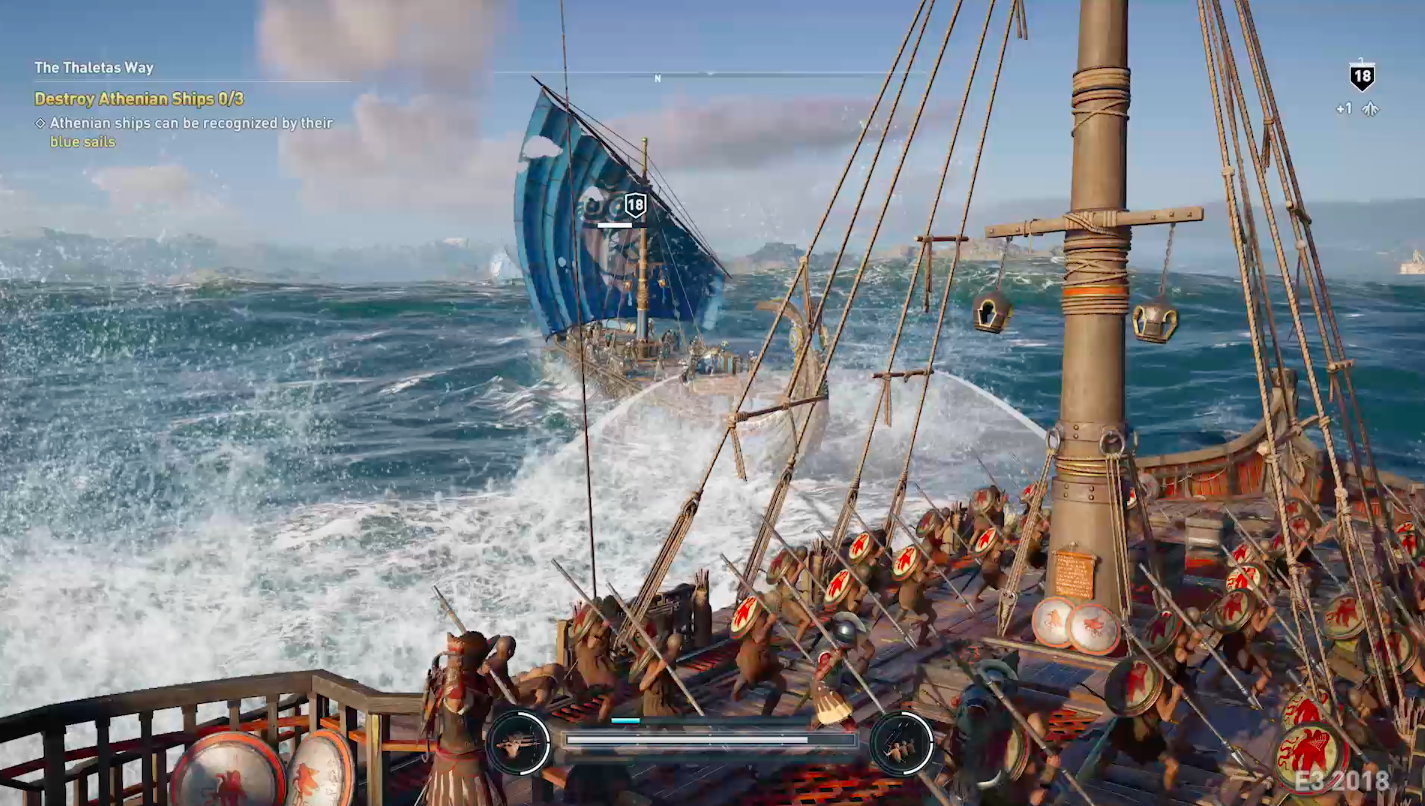
-
Most characters in the game can join your ship’s crew. The player’s ship is called the Adrestia, it sounds like it might double as their de facto HQ. Most of the game’s enemy combatants and even many of its civilians can be recruited to become part of the ship’s crew (or to serve as distractions on land for stealth-oriented players).
Those recruitable followers will offer stat bonuses and perks, some of which will be visible by your bird as it scouts the areas of the game’s landmasses that you explore.
According to the Odyssey developer who watched us play the game’s E3 demo, players will be able to customise the ship’s look, down to the gear the crew wears.
-
Odyssey‘s massive world will be influenced by a systemic power system that players can manipulate. The game’s version of Greece is divided into 27 states, each with their own leader. A red-vs-blue divide will show which areas are under the influence of Sparta or Athens, respectively.
“When those leaders get in trouble and their resources go down, they become weak,” Dumont said. “And other factions will invade their state.” It’s not clear if this happens automatically over time or if these changes in power are solely affected by players.
Leaders who are in trouble will offer contracts to get help, and the player, who is technically controlling a mercenary, can choose to take on those contracts, Dumont said. Players will also be charged with taking down some regional leaders and be shown a meter that displays how tight a grip the leader has on their state.
Looting and destroying things in the leader’s region will make the leader an easier target, a system that seems to build on ideas offered in everything from the first Crackdown to this year’s Far Cry 5.
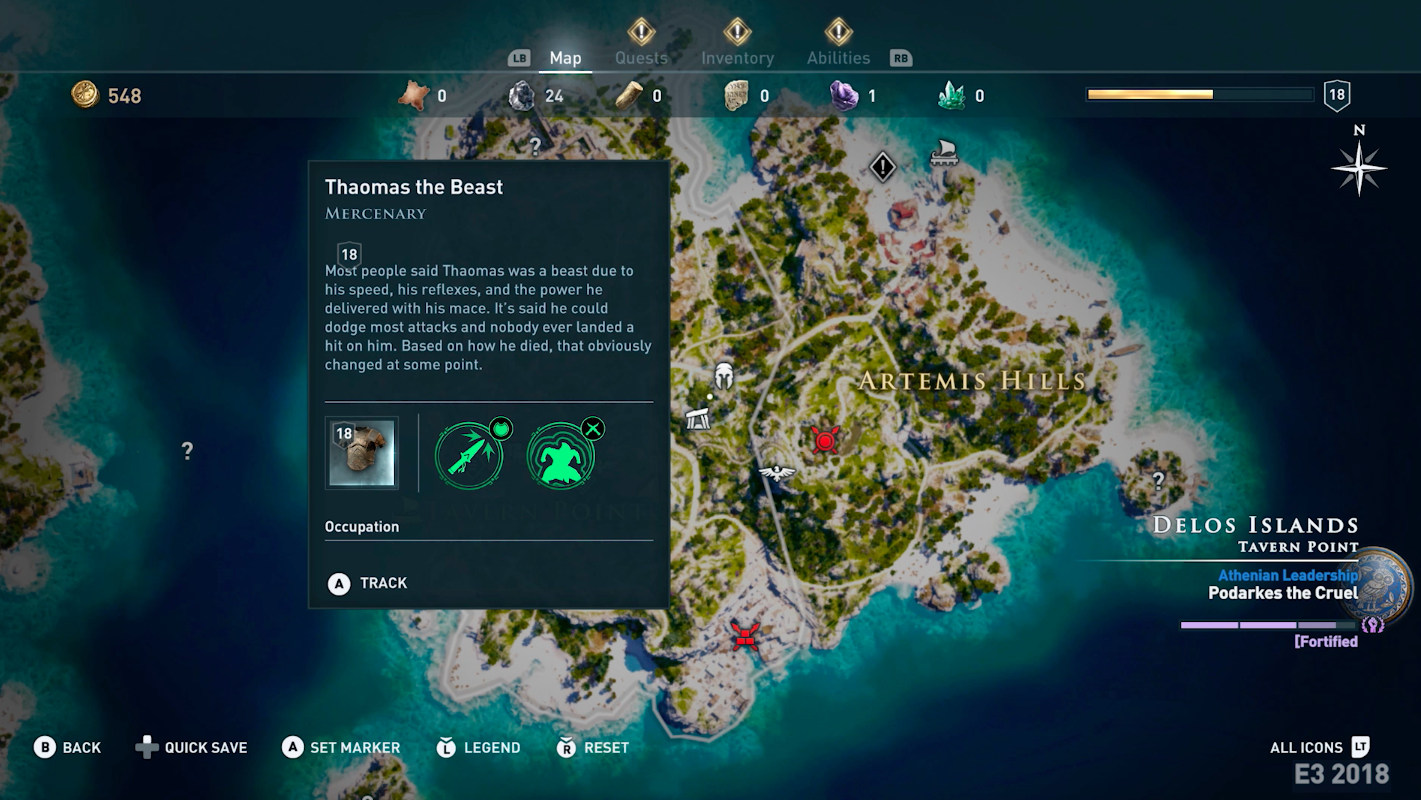
This regional map shows several locations of interest. It also has some information about a regional mercenary called the Beast. More importantly, a purple meter on the right shows the power of the region’s leader. Certain actions in the region deplete the meter, supposedly making the leader an easier target.
-
Players may also find themselves the target of mercenaries as bounties are put on their heads for various actions. The demo’s map showed indicators for rival mercenaries and for the people who hire those mercenaries, suggesting you can interact not just with people hunting you but those paying them.
If the player kills civilians, Dumont said, they can expect to find a bounty on their head. You can get hunted on the sea by other ships as well.
-
There will be epic land battles. One of Odyssey‘s additions to the franchise are large-scale battles featuring as many as 300 (ahem) brawling combatants. Some of these battles will be part of the game’s main storyline, others optional for players who wish to focus on them.
Dumont described them as a test of players’ combat skills. As players fight in them, they will be given sub-goals to target specific characters, such as a special enemy who might pop up. Dumont said that players who enter the battles with a bounty on their head will see mercenaries on the other side. He also warned of the appearance of formidable foes, such as Achilles.
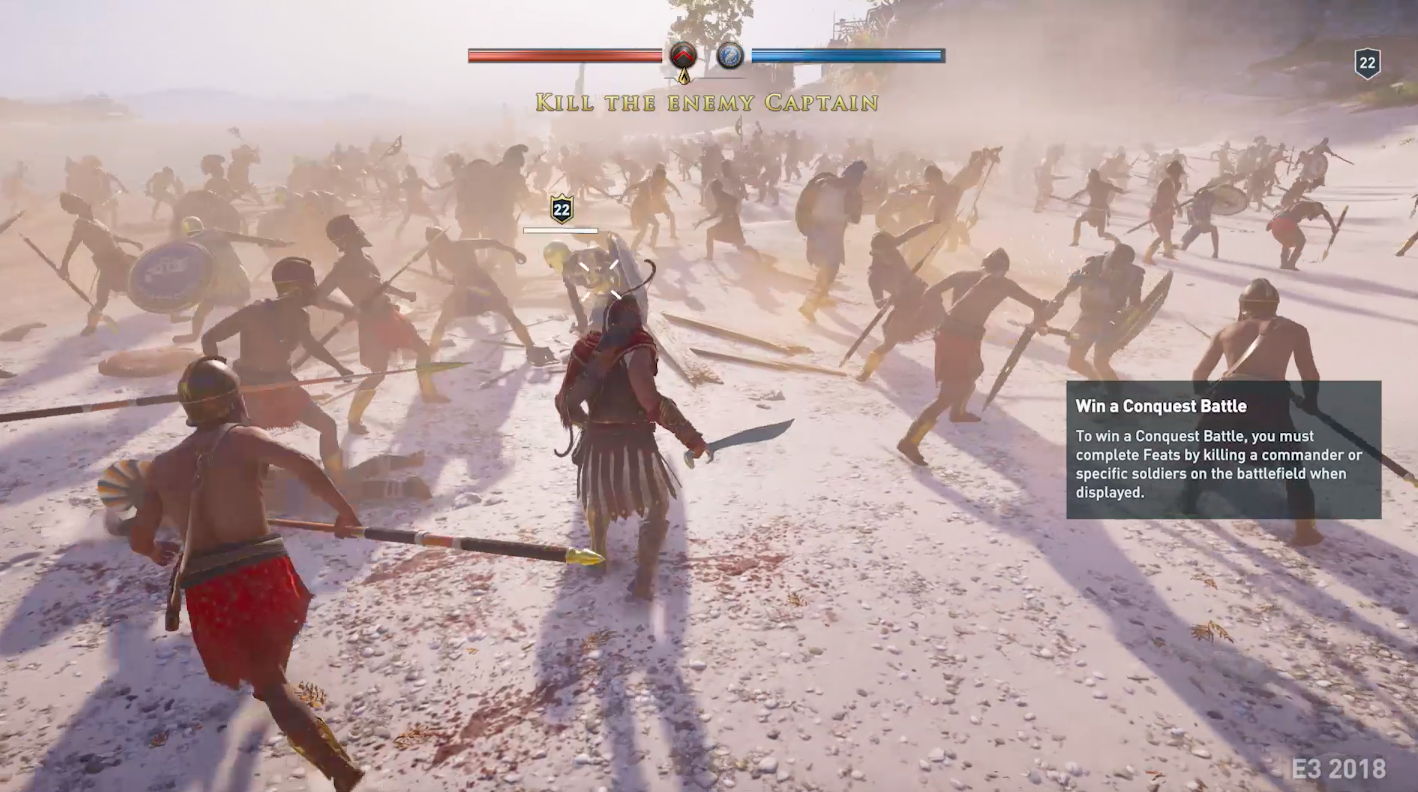
-
You can lie to people. The developers say their game will be as faithful to history as possible, but within that, they’re exploring ways for players to experience a malleable narrative.
Narrative director MacCoubrey said there are some 30 hours of interactive storytelling in the game and that players can interact with other characters in as many as 13 ways, not all of which will be presented in a given chat. Examples of such interactions might be lying or flirting or being aggressive, ideally with unpredictable outcomes.
“We wanted to really make sure that when you’re roleplaying and making choices, that the choices you’re making are grey,” MacCoubrey said. “So just because you’re lying to someone doesn’t mean you’re going to have a negative impact. And just because you’re friendly with someone doesn’t mean you’re going to have a positive impact.”
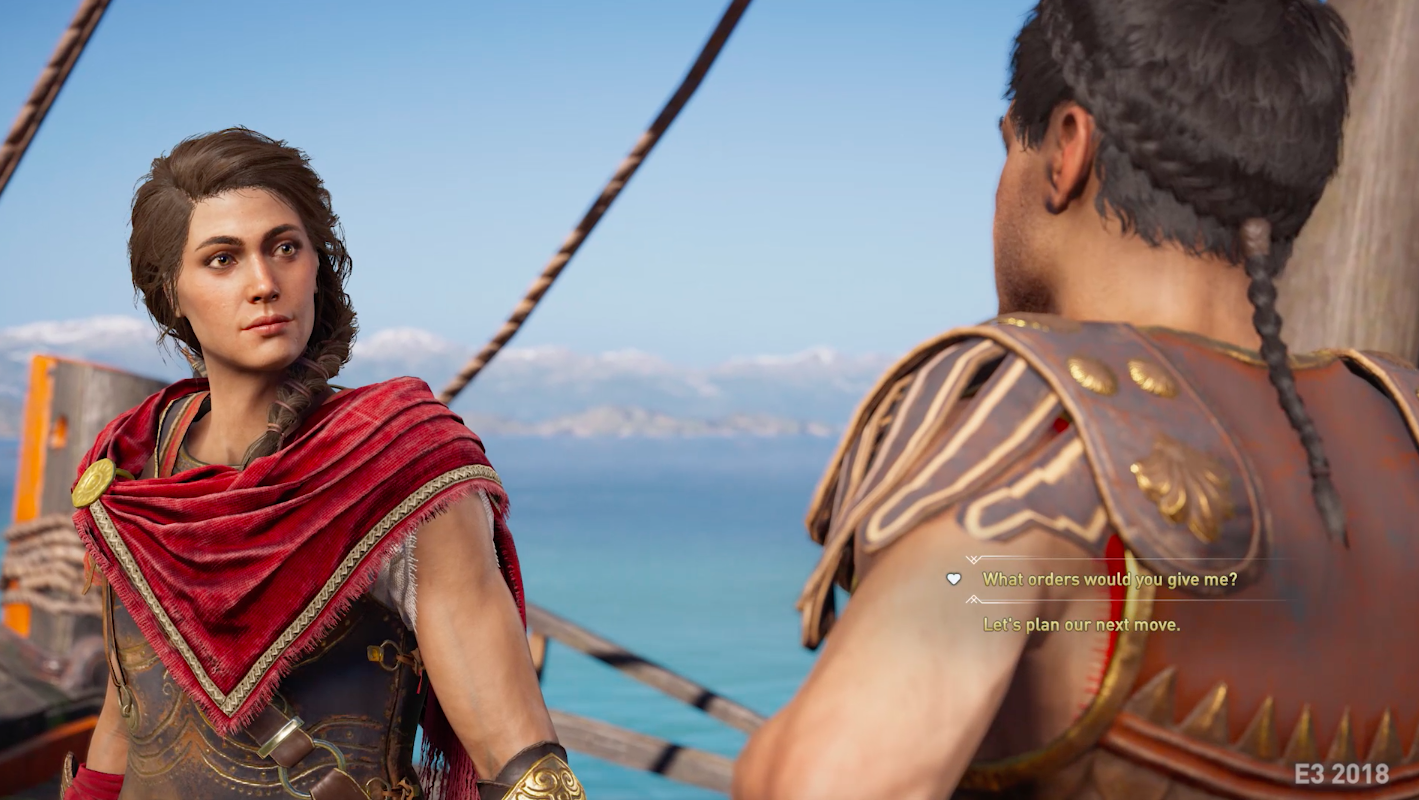
A romance dialogue option appears. See the heart next to one of the lines the player can choose? Kassandra has just made a crack about Thaletas’ speech. He’s pridefully shot back that he gives orders, not speeches. She (and the player) get a chance to flirt over that.
-
You can flirt. Romance options in Odyssey are also meant to be morally complex.
MacCoubrey said she doesn’t want them or any other relationship in the game to be a simple matter of giving characters something and reaping a reward. She wants players to feel like they’re getting to know characters who live in a specific context and she wants to be sure that it doesn’t feel like all of the world, including all of our heroes’ possible flings, revolves around the player’s character.
There’s one major romance option in the demo, in which the player, as Alexios or Kassandra, can try to romance the rebel Kira or a warrior she’s been warming to named Thaletas.
“Sometimes romance options can be seen as a very selfish way to go about things, too,” MacCoubrey said. “And one of the things I really love about the [E3] demo is if you want to pursue romance, fine, but you are interfering in somebody’s life. Kira and Thaletas already have a relationship, and what happens when you go into something that is already established?”
-
You can verbally spar with Socrates. Assassin’s Creed 2 had Da Vinci. Syndicate had Charles Dickens. Origins had Cleopatra. And now Odyssey has the father of medicine, Hippocrates, and the philosopher Socrates, whose name is spelled as “Sokrates” in the game.
He’s a quest-giver and in the E3 demo he doesn’t just give a quest, he also issues moral challenges. Before and after the quest, he asks what the morally right way to handle it would be. As the player’s character debates, the interactive dialogue system is in full effect.
“We wanted to make him feel different than every other quest-giver in the world,” MacCoubrey said. “Because he did treat people differently and he thought very differently and he was very much somebody who would double back on your decisions.”
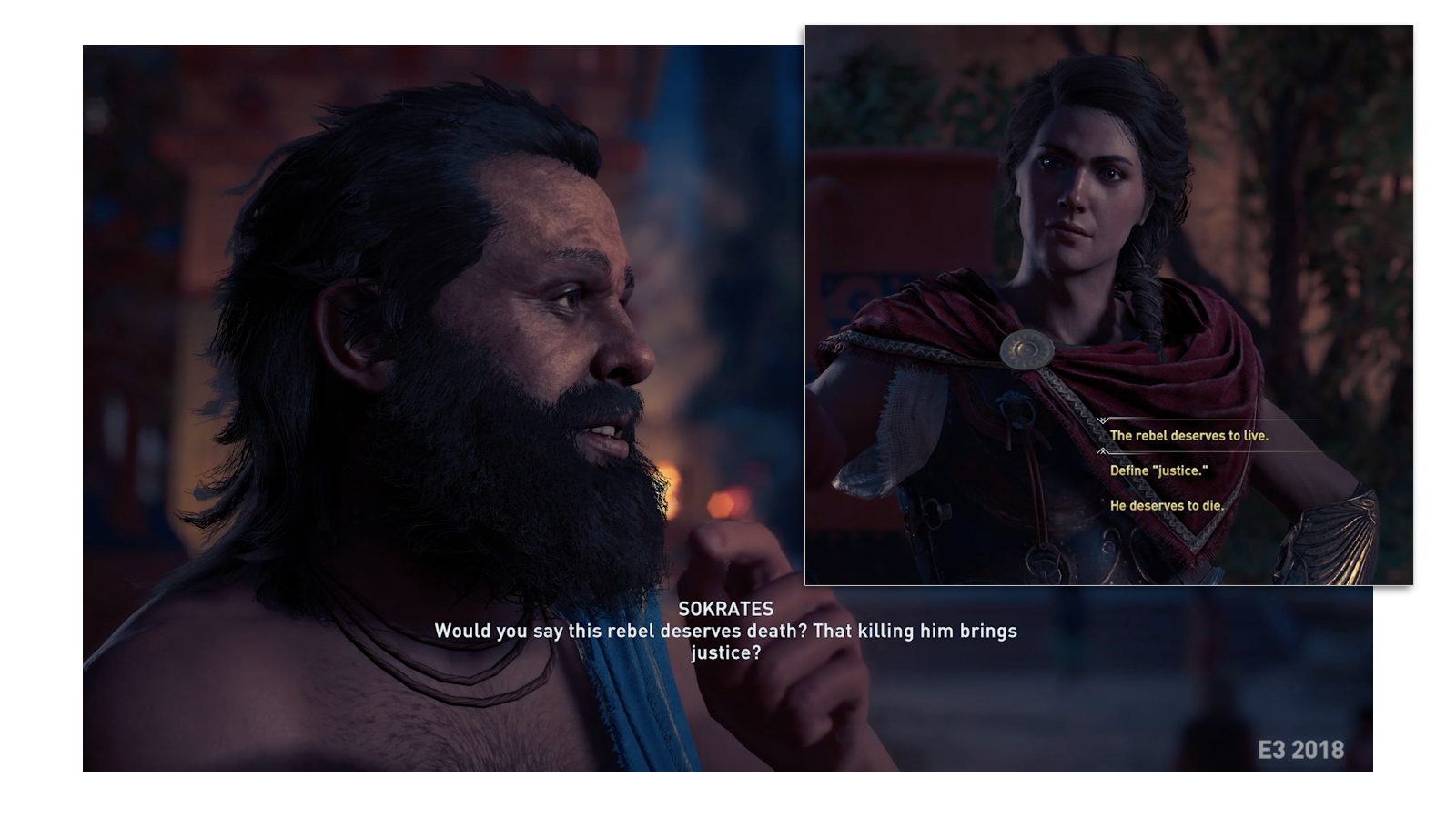
In the demo’s Socrates quest, the philosopher describes a not-quite hypothetical scenario involving a rebel who stole for a good cause but killed a guard in the process. The player can argue who is right or wrong. Then they can try to rescue the man and debate Socrates some more. Dialogue may be malleable to suit the action. Socrates commented on a guard I’d killed during the mission. He wouldn’t have said that, a developer told me, if I hadn’t killed anyone.
-
They’re sticking to real history as much as possible. While the game’s main quest and side quest can branch and have various endings, the developers say they’re both taking advantage of the mysterious nature of some historical character’s deaths but also trying to avoid violating whatever the history books say happened.
“We try to stay true to history as well,” Dumont said. “What’s cool about ancient Greece is that a lot of those characters died in mysterious [ways]. They didn’t document the death of people, moreso than they celebrated their lives and achievements.”
Added MacCoubrey: “We are very true to the history that was recorded.”
-
You don’t always have to kill. Many Assassin’s Creed quests, including the bulk of the 180+ in Assassin’s Creed Origins, task the player with killing someone. That makes sense, given that you’re an assassin, but sometimes Bayek seemed overly rough with some people in Origins, as other assassins have in earlier games.
When I asked if there’d be other ways to resolve some quests, Dumont could hardly keep himself from spoiling one. “We have a few quests where the objective is ‘deal with it’,” he said. “For example, ‘this guy owes me money, OK, deal with it.’ You can go there and kill him and take the money. Or you can go and ask. Or loot the treasure box in his house.”
-
I’m not sure if Zeus is going to show up. Assassin’s Creed Origins had some unadvertised supernatural battles, as well as a massive expansion that included some quite prominently advertised fantasy elements. Throughout their presentation of Odyssey, the game’s developers referred to Greek myths and gods, but nothing they have shown or mentioned indicates that players will encounter them, let alone battle them.
The developers are being cagey here. On the one hand, they’re suggesting that they will explore the roots of myths. For example, Dumont shared the idea that a man with an eyepatch might beat a second man up. That second man might tell this story to his wife, who might retell it to someone else, and within a thousand years that’s the story of a sheep-eating cyclops.
Dumont also suggested that the seemingly supernatural aspects of the First Civilisation could give the developers things to explore. I don’t know. If Kratos isn’t fighting Greek gods any more, I’m betting these AC heroes will find a way. And, actually, the game’s E3 gameplay trailer sure ends with what looks like a minotaur showing up.
And there’s more? Well, of course there is. This is a preview of an Assassin’s Creed game, and a Kotaku preview of an Assassin’s Creed game at that. Wouldn’t want to leave you all disappointed. Let’s do the lightning round.
- Like just about every other major Ubisoft game, Odyssey is not a one-studio operation. Ubsoft Quebec is the lead studio, but over email, a Ubisoft rep provided this supplemental list of nine other studios as well: Ubisoft Montreal, Montpellier, Kiev, Bucharest, Shanghai, Pune and Singapore studios / Sperasoft / Technicolor Games.
- Assassin’s Creed Origins‘ wonderful papyrus quests, which presented players with clues about treasures hidden in exotic parts of the game’s massive map, will return in the form of “Ainigmata Ostraka“. There’s at least one to be found in the game’s E3 demo, but the developer watching me play said the reward for it was deactivated so as to avoid spoiling something. Hmmm.
- You still have mounts. In the demo you have a horse named Phobos. But unlike in Origins, you can whistle for the horse while running, and it will run beside you and let you automatically mount your horse without slowing down. I loved this perhaps too much, but I’m the kind of oddball who doesn’t always call for a mount in a game because I don’t want to slow down to get on it.
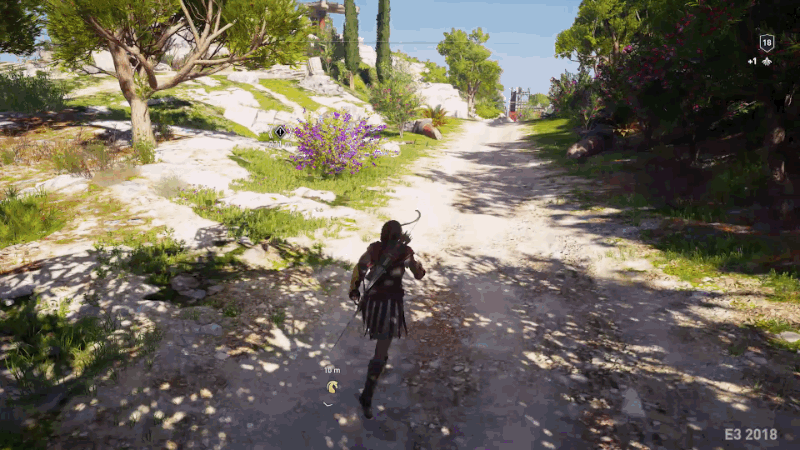
- Surely they are going to make an educational, non-violent Discovery Tour for this game’s ancient Greece setting as they did for Origins‘ ancient Egypt? Dumont: “We don’t want to communicate on that yet.”
- No indication of multiplayer. When asked, Dumont said players should think of Odyssey‘s online offering to at least be the same as Origins‘, and that it will be treated as a live game with post-release updates. The guy spent several years working on World of Warcraft at Blizzard, for whatever that’s worth.
- The game will have a photo mode.
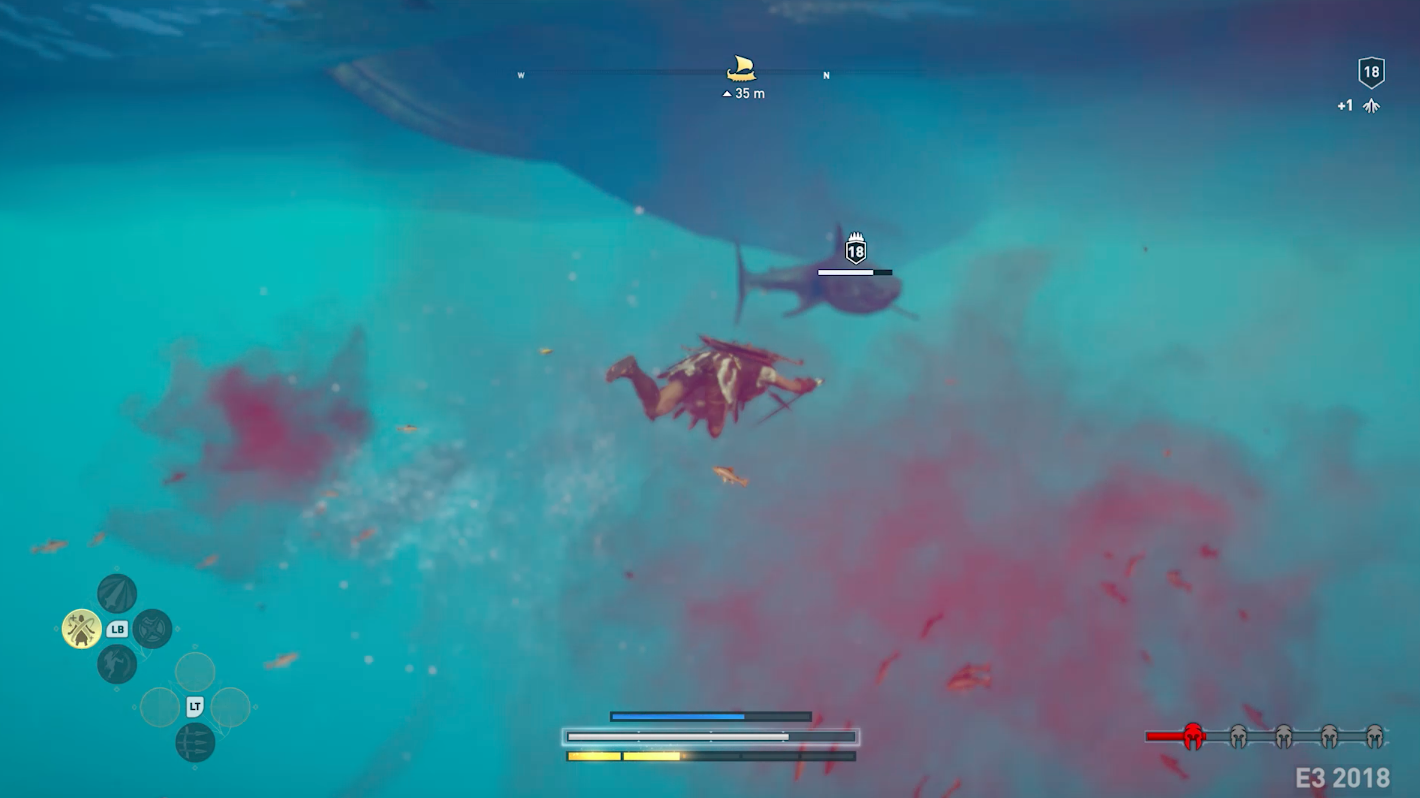
- There are sharks. And they might eat you (or your enemies). There are also “legendary animals” to hunt. I got mauled by a legendary bear.
-
Odyssey is set centuries before Origins‘ Bayek and Aya had their adventures, which of course raises the question of if/how the game could connect to the Egyptian adventures players saw in the most recent game.
“Maybe in the future at one point we might communicate on different things after that,” Dumont said, stumbling through an answer. We laughed a bit. “Realistically,” he said gathering himself, “at the heart is a continuation of Layla’s story, that’s our hook for the continuation.” Here is where I should probably vow to eat something inedible if Aya and Bayek don’t somehow find a way into Odyssey.
-
And what of the modern day story featuring Layla Hassan? It’s unusual enough to hear Ubisoft developers talking about the modern day part of their next Assassin’s Creed prior to release, but could we get more info? MacCoubrey confirmed that it’s largely optional for the people who aren’t into it.
And for the people who are? Dumont: “I think we have enough twists and turns in there to satisfy our more hardcore fans that like the modern day story and where it leads you. I’m kind of excited for what we have.” And is it as substantial as what was in Origins? “Oh,” he said. “It’s bigger.”
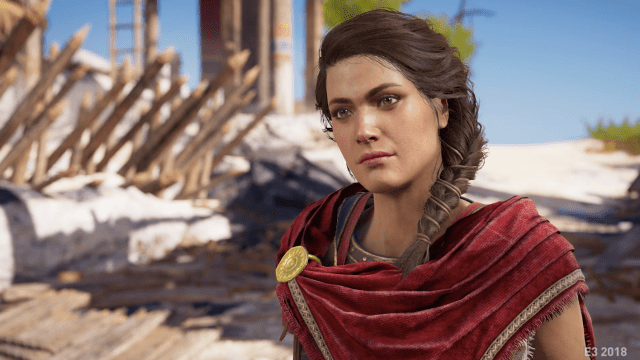
Comments
10 responses to “Everything We Learned About Assassin’s Creed Odyssey After Playing It”
I see theres been heaps ADDED to origins. i enjoy assassins creed but there comes a point when i can just see how many assets have been kept because its easier, and i get its because they have a tight schedule but god dam; why so much copy paste? the lighting doesnt even look different.
Haven’t they been doing the “experience memories of people you’re not related to” thing since Black Flag? The conceit was that Abstergo had refined the tech to the point where they could package up memories as a game that anyone could play.
In Unity, you were supposed to be some random person playing one of these games, who then gets contacted by some member of the assassins and do something that turns out to be entirely inconsequential.
I wish they would just drop the modern day stuff.
I disagree. Especially on large bases, it was easier to take the guards out one by one than to walk in the front gate.
This sounds and looks pretty good, and different enough to make it worth playing just one year after Origins came out.
This sounds like everything I want from an Assassin’s Creed game. Except the modern day stuff, which I’m glad is mostly optional. I haven’t minded that stuff in the past but I found Layla really annoying as a character.
I don’t understand people who dislike the modern AC stuff. It’s like being a Christen, but you don’t believe in Jesus, only God. The modern-day stuff is as important as the rest of it.
Ubisoft is going BioWare? I guess it makes sense for both companies to pivot. Inquisition and Andromeda felt like Ubi games: blandly massive worlds with pointless detours and collectables, while the BW stuff they did keep is getting dropped for Anthem.
(Uplay is still a deal-breaker. Obviously.)
If Uplay is a deal breaker, then so is Steam. Uplay AND Origin are now at a point where they’re almost as good, if not BETTER than Steam, especially now Valve is letting every shitty game in. Steam is slowly dying. The problem is, no one has realized it yet. Oh, it will still be around, but the ‘good old days’ of Steam are long gone.
We need an open world game like this, but with Dark Souls combat.
I thoroughly enjoyed origins and i am looking forward to this as well.
Is this even Assassins Creed anymore?
It’s in the same universe and you sneak around and murder people so yes?
“you automatically mount your horse without slowing down” – You could kind of do this in Origins too, you just had to tap the mount key when the horse caught up with you.
Great, I love games that make me feel like every single decision I make is wrong. Just like with Telltale.